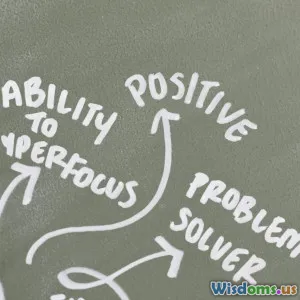
What Sports Teach About Building Mental Toughness for Success
9 min read Explore how sports cultivate mental toughness essential for personal and professional success, drawing from real-world examples and psychological insights. (0 Reviews)
What Sports Teach About Building Mental Toughness for Success
Mental toughness often spells the difference between triumph and defeat, both on the athletic field and in life’s broader endeavors. We admire athletes not only for their physical prowess but for their unshakeable resilience and unwavering focus under pressure. But what exactly is mental toughness? More importantly, how do sports teach us to cultivate it in ways that translate to personal and professional success?
Through decades of research and remarkable athlete performances, we understand that sports nurture essential psychological skills: perseverance despite setbacks, maintaining concentration amidst distraction, and dealing with high-pressure situations gracefully. This article explores the multidimensional lessons that sports provide on building mental toughness, supported by real-world examples, scientific research, and actionable advice.
Defining Mental Toughness: More Than Just Grit
Mental toughness is often mistaken for just sheer willpower, but it encompasses a combination of resilience, confidence, and emotional regulation. According to renowned sports psychologist Dr. Jim Loehr, mental toughness is the “ability to consistently perform toward the upper range of your talent and skill regardless of competitive circumstances.”
Key components include:
- Resilience: The ability to bounce back from failures or adverse experiences.
- Focus: Sustaining attention and blocking out distractions.
- Emotional control: Managing stress, anxiety, and emotions effectively.
For instance, tennis legend Serena Williams exemplifies mental toughness through her ability to handle match point pressure and comeback situations repeatedly throughout her career. Her famous reclaiming of Grand Slam titles after injuries or setbacks demonstrates mental toughness as both a skill and an attitude.
Lesson 1: Embracing Failure as Growth
Failure is inevitable, but sports uniquely train athletes to view it as a stepping stone rather than a dead end. From losing matches to poor performances during practice, athletes learn that failure fuels improvement.
Real-World Example
Michael Jordan, widely regarded as one of the greatest basketball players, famously said, “I have failed over and over and over again in my life. And that is why I succeed.” His career highlights emphasize perseverance where others drop out.
A 2017 study published in the Journal of Applied Sport Psychology highlights that athletes with higher mental toughness levels show adaptive coping strategies, meaning they embrace and learn from mistakes instead of succumbing to discouragement.
Practical Application
Embrace setbacks in your career or personal life as feedback. The next time you face rejection or an obstacle, reflect on it objectively, ask what can be learned, and adjust strategies accordingly.
Lesson 2: Developing Focus and Routine
Success in sports hinges on the capacity to maintain concentration during crucial moments, often when external distractions or intense pressure emerge.
Elite athletes develop pre-performance routines to carve focus zones—rituals like visualization, controlled breathing, or specific warm-ups.
Illustrative Story
Olympic gymnast Simone Biles uses breathing exercises and mental imagery to cope with the stress of competition, maintaining unparalleled focus, which often defines whether a complex routine succeeds or results in failure.
In a 2018 research by the International Journal of Sports Science, routines were found to significantly enhance athletes’ focus and performance consistency.
How You Can Apply This
Create your own performance routines before high-pressure situations, such as presentations or exams. Deep breathing or mental rehearsal can center your focus and reduce anxiety.
Lesson 3: Harnessing Discipline and Consistency
Sports teach that talent alone seldom wins championships — consistent hard work and discipline do. Mental toughness requires ongoing self-discipline to train, prepare, and push through fatigue.
Famous Example
Tom Brady, seven-time Super Bowl champion, credits his mental toughness to his rigorous dietary habits and relentless training discipline throughout decades. His ability to maintain peak performance well into his 40s demonstrates mental toughness extending well beyond physical ability.
A 2020 survey from the American Psychological Association reported a strong correlation between disciplined routines and greater stress resilience, underscoring how consistent habits build mental fortitude.
Practical Tips
Set clear, realistic goals daily or weekly and hold yourself accountable. Small, sustained efforts build momentum necessary for larger success.
Lesson 4: Cultivating Positive Self-Talk and Confidence
Athletes often battle inner doubt, but those who are mentally tough leverage positive self-talk strategies to maintain self-belief.
Example from Champions
Muhammad Ali’s famous mantra, “I am the greatest,” was not just bravado but a conscious cognitive strategy to instill confidence. Such affirmations can buffer against anxiety and boost performance.
Sports psychologists recommend positive affirmations and visualization as tools to rewire negative thought patterns.
Implementing Confidence Boosters
Regularly remind yourself of past successes and strengths. Visualize achieving your goals to reinforce belief and calm nerves.
Lesson 5: Building Emotional Resilience
High-pressure competitions evoke intense emotions: nervousness, frustration, anger. Sports train individuals to regulate emotions effectively to channel energy positively rather than let it sabotage performance.
Case Study
Basketball star LeBron James exhibits exceptional emotional control, maintaining composure even when opponents use provocation tactics. His calm demeanor enhances decision-making under pressure.
Mindfulness and meditation have grown popular among athletes as emotional regulation techniques, supported by studies demonstrating improved focus and reduced stress.
How You Can Learn Emotional Regulation
Practice mindfulness or meditation to become aware of your emotional triggers and respond mindfully rather than react impulsively.
Conclusion: Translating Sports’ Mental Toughness Into Broader Success
The lessons sports provide for building mental toughness are universally applicable beyond athletic arenas. Resilience in the face of failure, cultivating deep focus, embracing disciplined routines, fostering confidence, and managing emotions are pillars that fuel success across careers, relationships, and personal growth.
By embracing these principles, anyone can develop the psychological edge that drives lasting achievement. Next time a challenge arises, reflect on the athlete’s mindset principles and harness them to not just confront adversity but thrive through it.
As the proverb goes, “Pressure is what turns rough stones into diamonds.” Sports teach us how to endure that pressure and emerge stronger—and so can you.
References
- Loehr, J. (2012). The New Toughness Training for Sports. New York: Plume Publishing.
- Gucciardi, D.F., & Gordon, S. (2011). Mental toughness in sport: Developments in theory and research. Australian Psychologist, 46(4), 267–277.
- International Journal of Sports Science. (2018). Effects of pre-performance routines in athletes.
- Journal of Applied Sport Psychology. (2017). Adaptive coping strategies and mental toughness in athletes.
- American Psychological Association. (2020). Survey on discipline and stress resilience.
This in-depth understanding of how sports train mental toughness offers you actionable strategies to cultivate a mindset poised for enduring success.
Rate the Post
User Reviews
Popular Posts



















